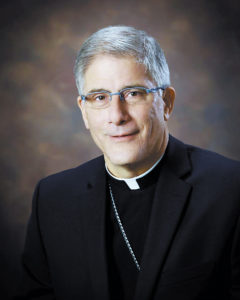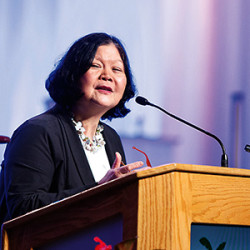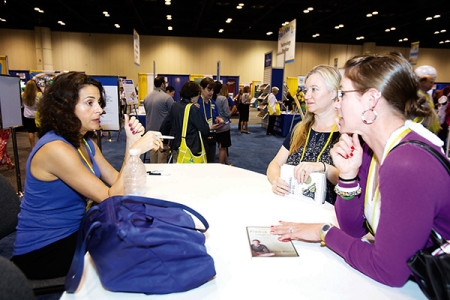
Bishop Kopacz
By Bishop Joseph Kopacz
Catholic Schools Week is celebrated this year from January 28 to February 3 wherever a diocese throughout the United States is blessed to have a Catholic School system. This year’s theme is: Catholic Schools: Learn. Serve. Lead. Succeed. Our legacy of schools in the Diocese of Jackson dates back to 1847 in Natchez before spreading upstream to Vicksburg and Greenville and then gradually fanning out eastward across the State of Mississippi. Because our diocese was the 13th Catholic diocese established in the nation, our Catholic School tradition began not too long after the first Catholic Schools were launched in the United States.
The founding mother and father of Catholic Education were St. Elizabeth Ann Seton and St. John Neumann. Elizabeth Ann Seton (1784-1821) was an Episcopalian believer through half of her life, and a wife and mother of six who always found the time for charitable works and outreach. She became a Catholic after the death of her husband and within a short time founded the Daughters of Charity based upon the rule of Saint Vincent de Paul and his religious community in France. Her mission became faith-based education, stepping out into deep and unchartered waters. She founded the first Catholic School in the United States in 1812, and by 1818 the sisters had established two orphanages and another school. Today, six groups of sisters can trace their origins to Mother Seton’s initial foundation. The following are excerpts from the writings and wisdom of this great matriarch.
“I share your struggles as educators today, and I am with you in that struggle. The signs of the times beg you to be spiritually mature to foster a climate of missionary renaissance faithful to (my) legacy of Catholic Education. Are you convinced of the need of a strategic vision in the name of the Gospel? Are you willing to risk carrying out new ideas that respond to absolute human need?
“What unmet needs exist in your school, parish or community that you can realistically address? How do you interface with public, private and home school networks? What new programs or courses would benefit your students or attract new ones? What timely services do you currently offer which can be extended to others? Are there ways you can combine efforts and resources for new ones? What improvements can be made by adopting new techniques? I invite you to discuss whether your definition of education really meets society’s changing needs.
“In your role as educators, focus on the whole person – teach the lesson and touch the heart. Above all, my friends, teach your pupils about God’s love for them. Oh! Set your gaze on the future and always strive to fit your students for the world in which they are destined to live.
“Good home-school relations were important to me and I often corresponded with parents about their children’s progress-or lack of it. I will tell you, I know American parents to be most difficult in hearing the faults of their children.
“I tried several methods of discipline but always with gentle firmness. I discovered the loss of recreation, deprivation of fruit, or payment of a a penny for good works often worked well. Kneeling down was also the only form of physical punishment I allowed.
“I shunned every form of prejudice or discrimination. Inclusiveness was my goal. My school was founded on the enduring values of respect and equality. I pray that you keep in mind that authentic Christian compassion is expressed universally rather than selectively. This is to be extended to mountain children who are poor, to the Pennsylvania Dutch children, and to the African American children of slaves and free parents whom I myself taught.”
Her Daughters of Charity came to Natchez in 1847 and remained until 2003. Saint Elizabeth Ann Seton was beautified in 1963 and canonized in 1976.
The patriarch of Catholic School education is Saint John Neumann who was born in 1811 in Bohemia in the modern day Czech Republic. After traveling to America he was ordained and entered the Redemptorist Order and faithfully served the poor in Buffalo, New York. Father John Neumann was appointed bishop of Philadelphia in 1852 and was the first to organize a diocesan Catholic school system. As a founder of Catholic Schools in this country, he increased the number of schools in his diocese from two to 100 in eight years and wrote catechisms and other pamphlets to teach the faith, while working to bring good teachers into the diocese. His life’s work was to spread the faith.
Bishop John Neumann never lost his love and concern for the people. On one visit to a rural parish, the parish priest picked him up in a manure wagon. Seated on a plank stretched over the wagon’s contents, John joked, “Have you ever seen such an entorage for a bishop!”
The ability to learn languages that had brought him to America led him to learn Spanish, French, Italian and Dutch so he could hear confessions in at least six languages. When Irish immigration started, he learned Gaelic so well that one Irish woman remarked, “Isn’t it grand that we have an Irish bishop!”
Once on a visit to Germany, he came back to the house he was staying in soaked by rain. When his host suggested he change his shoes, John remarked, “The only way I could change my shoes is by putting the left one on the right foot and the right one on the left foot. This is the only pair I own.”
The words of the Lord Jesus to “go and teach and make disciples of all the nations” were emblazoned in the hearts and minds of Saint Elizabeth Ann Seton and Saint John Neumann. May these patrons of Catholic School education continue to intercede for us as we strive to be faithful to our vision to “inspire disciples, to embrace diversity and to serve others” in our Catholic Schools in the Diocese of Jackson.


